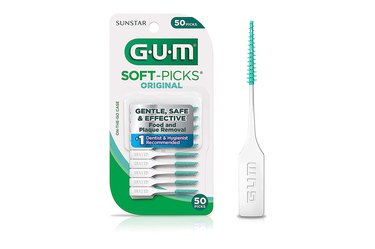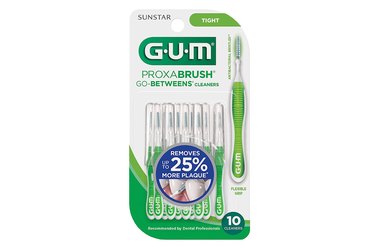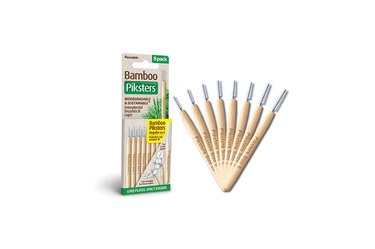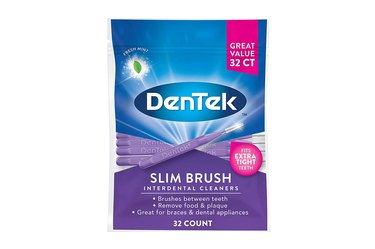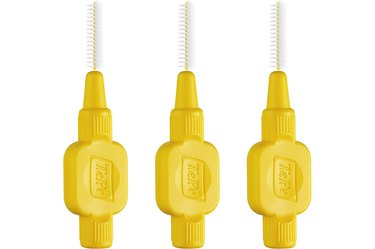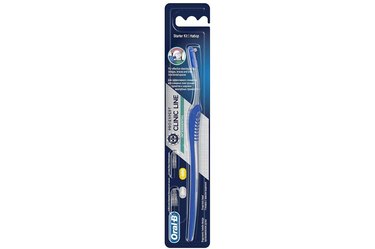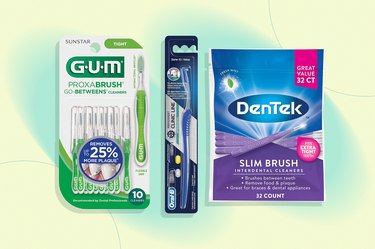
If brushing your teeth is part of your twice-daily regimen, then you're off to a great start in the fight against tooth decay and gum disease. But sometimes cavity-causing plaque can build up in between teeth, where it's difficult for your toothbrush to reach. That's when an interdental toothbrush can come in handy.
These small brushes fill the space between your pearly whites, scrubbing away dental plaque and food particles, dentist Kate Zoumboukos, DMD, with SW Austin Dental tells LIVESTRONG.com.
Video of the Day
Video of the Day
Steven C. Cohen, DMD, dentist at Livingston Smiles in New Jersey, notes that an interdental brush may be especially useful for you in three cases:
- You have trouble threading floss between your teeth
- You frequently get food particles stuck between your chompers
- You recently had dental work done and want to keep the affected area clean
While Dr. Cohen notes that flossing still reigns supreme, an interdental toothbrush is a good alternative, as it's a bit easier and still gets the job of removing plaque and other particles from between the teeth.
Here are some of the best interdental brushes on the market today, according to dentists.
The Best Interdental Brushes
- Best Overall: GUM Soft-Picks Original Dental Picks ($21.99, Amazon)
- Best on a Budget: GUM Proxabrush Go-Between Cleaners ($9.79, Walmart)
- Best All-Natural: Bamboo Piksters ($5.56, Ebay)
- Best Slim Brush: DenTek Slim Brush Interdental Cleaners ($5.94, Amazon)
- Best Reusable: TEPE Interdental Brush Original Cleaners ($6.89, Amazon)
- Best Handheld: Oral-B Interdental Brush Handle With 2 Tapered Refill Brushes ($7.98, Amazon)
How We Chose
We tapped four dentists, who offered product recommendations and broke down what to look for in an interdental brush. We selected these products based on their criteria, including:
- Appropriate brush head size(s)
- Soft bristles
- Flexible head
- Easy to hold and use
- Disposable, or stay-clean features if reusable
For more information on how we choose and cover products, click here.
1. Best Overall: GUM Soft-Picks Original Dental Picks
When it comes to an easy-to-use interdental toothbrush, GUM Soft-Picks are at the very top of the list. They have a deep-reaching curved handle and flexible bristles that easily sneak their way into hard-to-reach areas of your teeth to gently remove plaque, food particles and bacteria to keep your teeth clean. Because the brush head is so thin and flexible, it fits between most people's teeth, so you don't have to purchase a particular size.
This purchase comes with 320 picks meant for one-time use, just like floss, and also comes with four convenient travel cases for on-the-go use.
2. Best on a Budget: GUM Proxabrush Go-Betweens Cleaners
This is the interdental brush Dr. Zoumboukos uses in her practice. "Not only does this interdental toothbrush offer varying brush head sizes as well as flexible brush tips, but the handle is easy to hold," she says. "We encourage patients to keep the brushes with them throughout their day."
The triangular bristles are coated with an antibacterial to keep them clean between uses. They're able to get into the nooks and crannies of the teeth better than a conventional round bristle brush.
Choose from five different brush head sizes — Micro Tight, Ultra Tight, Tight, Moderate and Wide — or buy several if you need different sizes for different areas of your mouth.
3. Best All-Natural: Bamboo Piksters Interdental Brushes
If purchasing eco-friendly products is important to you, you'll be glad to know these are made from 97 percent biodegradable ingredients, including organically grown bamboo and plastic made from corn-derived polymers instead of crude oil.
In addition to being naturally antibacterial and antifungal, these interdental brushes are also quite practical and can be reused several times, which are some of the reasons Victoria Veytsman, DDS, cosmetic dentist and founder of Cosmetic Dental Studios with offices in New York and Beverly Hills, recommends them.
Their bamboo handle is firm and sturdy, which makes for easy maneuvering during use.
Buy it: Ebay; Price: $5.56 for an 8-pack
4. Best Slim Brush: DenTek Slim Brush Interdental Cleaners
Also an affordable option, these DenTek Slim Brush Interdental Cleaners make their way into hard-to-reach spots in between your teeth that your average toothbrush has a tough time reaching.
With soft bristle brushes and a wire that bends easily, you don't have to worry about any discomfort during use. They also have a minty flavor to them that's reminiscent of mouthwash, so you'll feel like you've rinsed after every cleaning session.
They're disposable, so you get a fresh clean each time, and they come in a pack of 32, which is enough to last you an entire month if you use them daily.
5. Best Reusable: TEPE Interdental Brush Original Cleaners
If you're the type to personalize your purchases, you'll be excited to know that this reusable interdental brush comes in nine fun colors, including orange, purple, yellow, blue and pink, all indicating different sizes, ranging from 0.4 to 1.5 mm, to provide the most personalized fit between your teeth.
Each of these has a flexible neck for easy access and gentle cleaning along with fully-coated wires that don't poke, providing the most pain-free experience even for sensitive gums.
Included in your purchase is a cap to keep the brush clean when not in use or when traveling.
6. Best Handheld: Oral-B Interdental Brush Handle With 2 Tapered Refill Brushes
For a basic interdental brush that's partially reusable (just the brush itself needs to be replaced now and then, not the handle), this is a great pick, Dr. Cohen says. It's convenient for cleaning hard-to-reach areas, especially for people with braces. All you need is a soft, back-and-forth motion to gently remove food particles, plaque and bacteria from in between teeth.
Buy it: Amazon; Price: $7.98 (comes with 2 brush heads)
What to Know Before You Buy an Interdental Brush
Before buying an interdental toothbrush, here are some things you should keep in mind:
1. Sizing
Most interdental toothbrushes come in various sizes to accommodate small or wide spaces in between your teeth. Dr. Veytsman says the brush shouldn't fit too tightly or make your gums bleed when the proper size is used.
"You may need a few different sizes depending on how different the spaces are between each of your teeth," she says. "The best size for you is determined based on what fits best, so either test out different sizes or ask your dentist for their input."
2. Timing
When choosing the right interdental brush, it can be helpful to consider when you'll likely use it.
They're great to use before bed (in addition to brushing your teeth) to ensure food particles aren't hiding in tough spots and sitting in your mouth overnight, Dr. Veytsman says. But you can also use them after a meal (similar to flossing), which means you may want to look for a brush that comes with a cap or carrying case so it's easy to cart around.
3. Lifespan
Some of these products are disposable, meaning they're meant for one-time use, while others are reusable. Keep this in mind when looking at price.
If the brush is reusable, pay close attention to the bristles, Dr. Cohen says: When they start to fray, it's time to sub in a new brush head (about once every three months, like your toothbrush).
Finally, if the brush is reusable, it should come with some kind of feature to help it stay clean between uses, like antibacterial bristles and/or a cap.
4. How It Compares to Floss
There's a long held debate over which is better. Most dentists would likely say floss, according to Robert Raimondi, DMD, of One Manhattan Dental, but he also notes that any method you use to clean between your teeth is going to be better than not cleaning there at all.
An interdental brush can also be easier to use, because it's less likely to break than basic floss and can be more convenient to navigate with braces. "How you're cleaning is more important than what you're using," Dr. Raimondi adds.
5. Benefits to the Gums
The area of your mouth that benefits the most from using an interdental brush is your gums, Dr. Raimondi says: "These brushes break up the bacteria biofilm, mechanically get rid of debris and stimulate the gums to help reduce the risk of tooth decay and gum disease."
With that in mind, though, the brush should also have soft bristles that don't cause pain or discomfort in your gum area.
You can dip the brush in coconut oil to get an even better clean: A March-April 2015 report in the Nigerian Medical Journal found coconut oil is effective in helping to reduce plaque formation and plaque-induced gingivitis.
Was this article helpful?
150 Characters Max
0/150
Thank you for sharing!
Thank you for your feedback!
Is this an emergency? If you are experiencing serious medical symptoms, please see the National Library of Medicine’s list of signs you need emergency medical attention or call 911.
